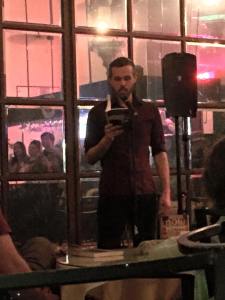I’ll be presenting at two panels at the 2020 AWP Conference in San Antonio, both of which I conceived and put together. Both cover topics that are important to me, and they’re the first AWP panels that I’ll be a part of, which ticks off an item on my bucket list.
The first is scheduled for Thursday, March 5 at 12:10 PM in Room 006C, River Level at the Henry B. Gonzalez Convention Center, and it’s the subject of this post.
Give It a Name: Mental Health and the Writing Life
The writing life is one of solitude and struggle, and for some writers who deal with mental illness it can seem insurmountable. Panelists will discuss how identifying and naming their mental health concerns informs their work and opens avenues to successfully navigating the challenging paths towards publication and participating in literary culture. From cultivating a consistent writing practice through marketing and publicity, panelists will share their experiences with coping while working.
I’ll be joined by Bruce Owens Grimm and Sarah Fawn Montgomery. Below are the initial remarks that I’ve included in the event outline:
Managing my depression, anxiety, and Borderline Personality Disorder (BPD) while pursuing publishing success as a writer requires vigilance, informed life decisions and practices, and balance through outside interests. The first step towards management was to give my particular struggles their proper names. Once I was able to identify them, I was able, through certain interventions, to find balance. Writing is difficult for all writers and often lonely; writing while trying to manage mental health sometimes seems impossible. What strategies work best for handling the solitude that writing requires, the constant rejection, the pressures of networking and fitting in, etc. are as unique as our individual writing voices, but general practices through therapies such as dialectical behavior therapy (DBT) and cognitive behavior therapy (CBT) have proven helpful, and I’m here to witness this. I’ve also found that avoiding loading so much of my identity into my writing has helped with perspective and coping. Alongside writing, I’ve found that fitness, bibliotherapy, music, and working with my hands have provided a crucial foundation from which I send my work out to be picked apart, rejected, and sometimes accepted.
_________________________________________________________________________________________

This event is also important for me because it’ll be the first time I’ll publicly speak about my mental health, and I recognize that it’s a crucial first step if I’m going to pursue memoir/essay writing that explores my personal history.
I want to be open to all possibilities, and I want to open myself to others so that I might be able to offer help or an empathetic ear. I’ve also been planning on pursuing a master’s degree in clinical mental health counseling, and I’d like to explore my own experiences as a means with which to prepare. Ultimately, I’d like to serve under-served clients with personality disorder diagnoses, if possible.
But I’m getting ahead of myself. The panel comes first, and so if you or someone you know is attending the conference and may be interested in our topic, please consider coming or encourage that someone to attend. At last year’s conference in Portland, I noticed that mental health is under-represented itself on the list of panels. There were a few about trauma and writing, and writing about trauma, and they’re definitely necessary, but there’s so much more that needs the space for discussion. (To be fair, mental health topics are much better represented at this year’s conference, so cheers to the selection committee. This is a great step forward!) I also believe that there’s a need and room for an AWP mental health caucus, but that’s a topic for another day.
You must be logged in to post a comment.